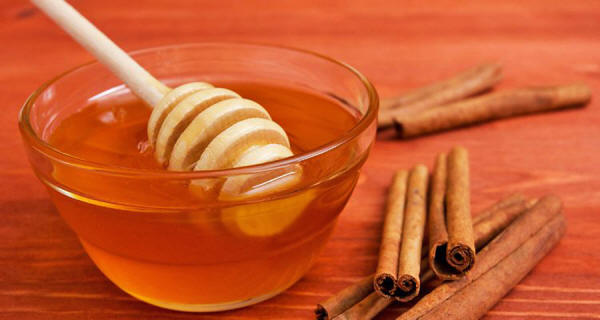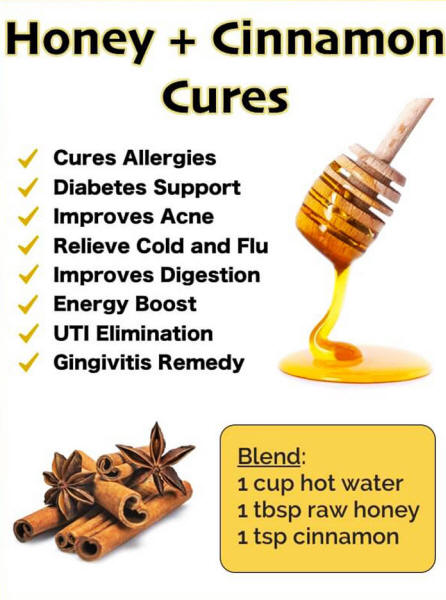|

by Dr. Axe Fans
March 24,
2014
from
DrAxe Website
Spanish
version
Italian
version

Could
the honey and cinnamon cure work
for you?
Cinnamon has been used by
Chinese and Ayurvedic folk medicine for over 2,000 years and honey
also has a rich history dating back to ancient Greek, Roman, Vedic,
and Egyptian texts.
The healing properties of honey were even referenced by Aristotle
(384-322 BC) and Aristoxenus (320 BC).
Countless stories from
people being cured from everything from diabetes (type 2) to acne
have filled the natural health testimonials since honey and cinnamon
were first discovered.
Here are some of the most historically common ways honey and
cinnamon have been used to treat and heal various health
conditions...
Honey and Cinnamon
Cure Under Fire

Ever since Beatrice
Dexter wrote an article for The Weekly World News tabloid
in 1995 claiming that honey and cinnamon can cure virtually
anything, this tasty combo has been under hot scrutiny by health
enthusiasts and scientists alike.
At this point, conclusive evidence suggesting that a honey and
cinnamon mixture will produce miraculous results is lacking in the
scientific literature, which is why the medical community is quite
reluctant to recommend it to their patients.
However, in my opinion, if you take the individual healing
properties of each, it is not preposterous to assume that if one is
good by itself, then the two combined can only be great!
I see this a lot in essential oil studies where specific blends have
healing property several times more potent than the individual
ingredients and I suspect the same thing is true with honey and
cinnamon.
Honey and
Cinnamon Health Benefits
Cinnamon (cassia) has been shown to be especially beneficial in
treating digestive disorders, menstrual discomfort and joint pain
because of its high content of cinnamaldehyde (the anti-inflammatory
molecular compound that gives cinnamon its flavor and odor).
Honey is also known for its anti-inflammatory properties, in
addition to being full of nutrients such as:
-
Amino acids
-
Vitamin C
-
Riboflavin
-
Niacin
-
Vitamin B6
-
Folate
-
Calcium
-
Iron
-
Magnesium
-
Phosphorus
-
Potassium
-
Zinc
At the end of the day,
recent research is just tapping into the powerful antimicrobial,
anti-inflammatory and antioxidant characteristics of honey and
cinnamon.
It is most likely that
these powerful healing properties have led to "miracle" healings for
countless people since the beginning of time.
8 Medicinal
Uses for Honey and Cinnamon
The reasons these two superfoods create such a powerful effect on
the body vary, but they generally center on their ability to control
inflammation, combat free radicals and boost the immune system.
Some other common health
benefits oftentimes experienced by people mixing honey and cinnamon
together are:
1.
Allergies
A perfect example of
how cinnamon can help with allergies can be seen in an Egyptian
study that evaluated its ability to control the powerful
allergen house mites.
This allergen has
become a global problem and the University of Kentucky College
of Agriculture, Food and Environment states that at least 45% of
young people with asthma are allergic to house dust mites!
Researchers from Egypt tested the effect that various essential
oils had in killing the highly allergic house mite and found
that cinnamon was the most potent agent.
Regarding honey, taking just a teaspoon of local raw honey every
day can boost your immune system by helping build a tolerance to
local pollen and naturally fight allergies.
The International Archives of Allergy and Immunology published
an article that tested this theory and discovered that
pre-seasonal use of birch pollen honey helped people with birch
pollen allergies by lowering total symptoms by 60%, experiencing
twice as many asymptomatic days, having 70% fewer days with
severe symptoms, and by using 50% less antihistamines compared
to the group that took conventional meds.
2.
Diabetes
Recent studies
published out of the journals Nutrition Research and
Parmacognosy Research suggest that up to 1,500 mg of cinnamon
supplementation benefits the lipid profile, liver enzymes,
insulin resistance, and high-sensitivity C-reactive protein in
diabetics and people with nonalcoholic fatty liver disease
patients (the #1 cause of liver disease in the world).
According to a study out of Dubai, honey has been observed to
cause a lower elevation of plasma glucose levels in diabetics
compared to dextrose and sucrose.
Some suggest that the
insulin boosting power of cinnamon can counteract this glucose
elevation in honey, which would make your honey/cinnamon mixture
a low glycemic index food!
3. Acne &
Skin Infection
Cinnamon oil mixed
with honey is used all over the world to treat skin conditions
such as acne and skin infections because of its antimicrobial
capacity.
Researchers from Iran have even discovered that because of its
antibacterial, anti-inflammatory and antioxidant properties
honey is actually more potent in treating wounds and burns and
result in less skin infection than conventional medicine!
4. Common
Cold
In a study published
in the American Journal of Chinese Medicine, cinnamon essential
oil was found to be highly effective in slowing the growth of a
number of bacteria and fungus including,
-
E. coli
-
Candida
-
Staph aureus,
...microorganisms
that can cause a number of diseases including the common cold.
Essentially, when regularly combined with immune-boosting raw
honey, many people never get sick at all. Or, if they do get
sick with the common cold, they recover rapidly!
5. UTI
The Iran Journal
of Medical Sciences published a study this past year that
evaluated 28 plant extracts against Gram-negative such as E.
coli (the main cause of urinary track infections).
Cinnamomum zeylanicum ranked in the top 4 most potent, which
provides an explanation to why people who supplement cinnamon
and antibacterial honey into their diets reportedly suffer from
less UTI's (urinary tract infection) than people who don't.
6.
Digestive issues
Honey and cinnamon
have become quite popular in managing digestive issues such as,
-
constipation
-
nausea
-
ulcers
Because honey is
predigested nectar, it is easy for the body to break it down,
which can soothe an aggravated system.
Cinnamon, because of its antimicrobial characteristics, has
helped countless people with bacterial overload in their
digestive system; especially with people suffering from an E.
coli infection as you just read in the study out of Iran.
7. Energy
Chinese folk medicine
has used cinnamon to promote a healthy flow vital energy for
centuries, and because of its insulin-boosting property,
cinnamon has been known to give people energy as it stabilizes
your blood sugar.
And, of course, honey is pure energy.
So, when you take a
teaspoon mixture of the two, you get a low-glycemic boost to
help fuel your burst training or when you simply need a
pick-me-up throughout the day!
8.
Gingivitis
The past few years,
several studies have come out claiming that
Manuka honey can help cure
gingivitis and periodontal disease.
Due to its superior antimicrobial properties, researchers from
the School of Dentistry, University of Otago, Dunedin, New
Zealand discovered that chewing/sucking on a Manuka honey
product not only caused a 35% decrease in plaque, it led to a
35% reduction in bleeding sites in people suffering from
gingivitis!
When combined with the powerful antimicrobial cinnamon, regular
use of the amazing mixture can do wonders to your smile!
Honey and cinnamon
benefits are proving to be a winning combination.
To make this amazing and simple recipe just mix:
1 cup hot water
1 tbsp raw honey
1 tsp cinnamon
References
-
NCCAM. Cinnamon.
[Internet]. No copyright – public domain. Available at:
http://nccam.nih.gov/health/cinnamon
-
Potter M. House
dust mites. [Internet]. Copyright 2010. Available at:
http://www2.ca.uky.edu/entomology/entfacts/ef646.asp.
-
Saad el-Z, et al.
Acaricidal activities of some essential oils and their
monoterpenoidal constituents against house dust mite,
Dermatophagoides pteronyssinus (Acari: Pyroglyphidae). J
Zhejiang Univ Sci B 2006; 7(12):957-62.
-
Ooi LS, et al.
Antimicrobial activities of cinnamon oil and cinnamaldehyde
from the Chinese medicinal herb Cinnamomum cassia Blume. Am
J Chin Med 2006; 34(3):511-22.
-
Yaghoobi R, et
al. Evidence for Clinical Use of Honey in Wound Healing as
an Anti-bacterial, Anti-inflammatory Anti-oxidant and
Anti-viral Agent: A Review. Jundishapur J Nat Pharm Prod
2013; 8(3):100-104
-
Saarinen K, et
al. Birch pollen honey for birch pollen allergy–a randomized
controlled pilot study. Int Arch Allergy Immunol 2011;
155(2):160-6.
-
Askari F, et al.
Cinnamon may have therapeutic benefits on lipid profile,
liver enzymes, insulin resistance, and high-sensitivity
C-reactive protein in nonalcoholic fatty liver disease
patients. Nutr Res 2014; 34(2):143-8.
-
Al-Waili NS.
Natural honey lowers plasma glucose, C-reactive protein,
homocysteine, and blood lipids in healthy, diabetic, and
hyperlipidemic subjects: comparison with dextrose and
sucrose. J Med Food 2004;7(1):100-7.
-
Ranasinghe P, et
al. Effects of Cinnamomum zeylanicum (Ceylon cinnamon) on
blood glucose and lipids in a diabetic and healthy rat
model. Pharmacognosy Res 2012; 4(2):73-9.
-
English HK, et
al. The effects of manuka honey on plaque and gingivitis: a
pilot study. J Int Acad Periodontol 2004; 6(2):63-7.
| 


